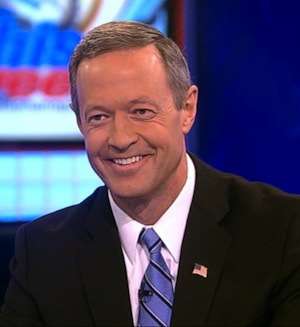O'Malley's March to the Left?
The former Maryland governor reframes himself.

Two strange things have been happening in Martin O'Malley's prospective presidential campaign. The first: He keeps running further to the left. The Maryland Democrat has always been a liberal, but not exactly the populist kind—he's been both my mayor and my governor, and I've come to think of him as a technocrat who likes to tout his trade missions, not a progressive insurgent attacking a trade pact. Now he's not just denouncing the Trans-Pacific Partnership; he's calling for expanded Social Security benefits and a $15-an-hour minimum wage. Last week The New Republic's Danny Vinik declared that O'Malley had moved "not just to the left of Clinton but even to the left of Senator Elizabeth Warren." In the civil war between Rahm Emanuel Democrats and Bill de Blasio Democrats—a conflict that had been playing out mostly on the state and local level, but has now hit Washington in the fight over the TPP—O'Malley has decided his best path forward is to reframe himself as a de Blasio.
The second strange thing: This appears to be working for him. Oh, he's still polling miserably, and the most prominent names saying they'll back him, folks like former Colorado senator Gary Hart and former Miami mayor Manny Diaz, tend to be old O'Malley allies, not major defectors from Camp Clinton. The candidate's chances of pulling an upset remain miniscule. But he's getting far more media attention than those other prospective anti-Clintons, Jim Webb and Bernie Sanders. The press wants a contest for the Democratic nomination, and the press understands that such a contest would most likely take the form of Clinton battling someone to her left. Webb and Sanders make more plausible populists than O'Malley does, but they also sound even less plausible as nominees (though Sanders is actually outpolling O'Malley at the moment). So when the governor starts out-Warrening Warren, he gets attention.
He's still extraordinarily reluctant to criticize Clinton by name. Perhaps that's because he hardly needs to. We've reached the point where he can allude to the frontrunner in the vaguest possible terms (declaring, say, that workers "deserve to know where leaders stand"—a decoder-ring reference to Clinton's dithering on the TPP) and still get headlines saying he's "getting bolder and bolder." (Like I said, the media craves a contest to cover.) Or perhaps, as many of us have been suggesting from the beginning, the governor is ultimately seeking a post in a Hillary Clinton administration and doesn't want to step over the line. Criticizing Clinton from the left might be useful to O'Malley's ambitions. Being frank about who he's assailing, in a way that could come back to haunt him, might not.


Show Comments (29)